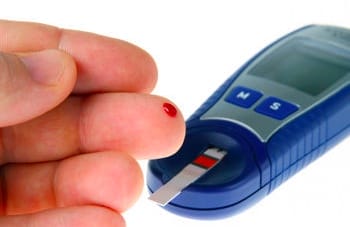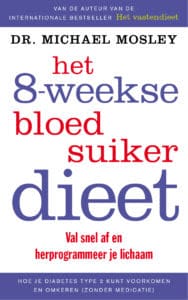
Nieuw onderzoek in The Lancet: het 8-weekse bloedsuikerdieet kan diabetes type 2 omkeren
ArrayMichael Mosley legt in Het 8-weekse bloedsuikerdieet uit hoe Professor Roy Taylor van Newcastle University heeft aangetoond dat een teveel aan visceraal vet, orgaanvet, in verreweg de meeste gevallen de trigger is voor diabetes type 2. In kleinere pilot studies heeft hij eerder aangetoond dat het mogelijk is om diabetes type 2 om te keren door patiënten te helpen slechts 1 gram vet uit de alvleesklier te verliezen. Daartoe moeten ze ongeveer 10% van hun lichaamsgewicht verliezen.
Nieuw onderzoek van Roy Taylor en anderen dat vandaag, 5 december, in The Lancet is gepubliceerd, bevestigt deze eerdere resultaten.
Zie hieronder het persbericht van The Lancet.
In het nieuwe onderzoek werden meer dan 300 patiënten met diabetes type 2 willekeurig toegewezen aan ofwel een standaardbehandeling of een dieet met 800 calorieën per dag g edurende 8 weken. Daarna werden ze twee jaar lang gevolgd. De helft van degenen die het 800-calorieën dieet deed, slaagde erin hun bloedsuikerspiegel terug te brengen naar normale waarden en kon stoppen met medicatie, vergeleken met 4% in de controlegroep. 90% van degenen die 15 kilo of meer verloren, heeft geen last meer van diabetes.
edurende 8 weken. Daarna werden ze twee jaar lang gevolgd. De helft van degenen die het 800-calorieën dieet deed, slaagde erin hun bloedsuikerspiegel terug te brengen naar normale waarden en kon stoppen met medicatie, vergeleken met 4% in de controlegroep. 90% van degenen die 15 kilo of meer verloren, heeft geen last meer van diabetes.
Het recent verschenen boek Het 8-weekse bloedsuikerdieet van Michael Mosley met een voorwoord van professor Roy Taylor laat zien waarom en hoe we in 8 weken snel en goed kunnen afvallen en diabetes type 2 kunnen omkeren.
Bron: UITGEVERIJ NIEUWEZIJDS
——————————————————————————————————
The Lancet: Weight management programme can put type 2 diabetes into remission
Almost half of participants achieved and maintained diabetes remission at one year without antidiabetic medications
Type 2 diabetes can be reversed following an intensive weight management programme, according a randomised trial in adults who have had the condition for up to 6 years, published in The Lancet.
The study showed that after 1 year, participants had lost an average of 10kg, and nearly half had reverted to a non-diabetic state without using any diabetes treatment. The findings lend support to the widespread use of this type of intervention in the routine care of type 2 diabetes across health services.
“Our findings suggest that even if you have had type 2 diabetes for 6 years, putting the disease into remission is feasible”, says Professor Michael Lean from the University of Glasgow who co-led the study. “In contrast to other approaches, we focus on the need for long-term maintenance of weight loss through diet and exercise and encourage flexibility to optimise individual results.”[1]
Worldwide, the number of people with type 2 diabetes has quadrupled over 35 years, rising from 108 million in 1980 to 422 million in 2014. This is expected to climb to 642 million by 2040. This increase has been linked to rising levels of obesity and the accumulation of intra-abdominal fat. Type 2 diabetes affects almost 1 in 10 adults in the UK and costs the NHS around £14 billion a year.
“Rather than addressing the root cause, management guidelines for type 2 diabetes focus on reducing blood sugar levels through drug treatments. Diet and lifestyle are touched upon but diabetes remission by cutting calories is rarely discussed”, explains Professor Roy Taylor from Newcastle University, UK, who co-led the study.[1]
“A major difference from other studies is that we advised a period of dietary weight loss with no increase in physical activity, but during the long-term follow up increased daily activity is important. Bariatric surgery can achieve remission of diabetes in about three-quarters of people, but it is more expensive and risky, and is only available to a small number of patients.”[1]
Previous research by the same team confirmed the Twin Cycle Hypothesis—that type 2 diabetes is caused by excess fat within the liver and pancreas—and established that people with the disease can be returned to normal glucose control by consuming a very low calorie diet. [2] But whether this type of intensive weight management is practicable and can achieve remission of type 2 diabetes in routine primary care was not known until now.
The Diabetes Remission Clinical Trial (DiRECT), published today, included 298 adults aged 20–65 years who had been diagnosed with type 2 diabetes in the past 6 years from 49 primary care practices across Scotland and the Tyneside region of England between July 2014 and August 2016. Practices were randomly assigned to provide either the Counterweight-plus weight management programme delivered by practice dieticians or nurses (149 individuals) or best practice care under current guidelines (control; 149 individuals).
The weight management programme began with a diet replacement phase, consisting of a low calorie formula diet (825–853 calories/day for 3 to 5 months), followed by stepped food reintroduction (2–8 weeks), and ongoing support for weight loss maintenance including cognitive behavioural therapy combined with strategies to increase physical activity. [3] Antidiabetic and blood pressure-lowering drugs were all stopped at the start of the programme.
The primary outcomes were weight loss of 15 kg or more (sufficient to achieve remission of diabetes in most cases), and remission of diabetes. Remission was defined as achievement of a glycated haemoglobin A1c (HbA1c) level of less than 6.5% at 12 months, off all medications.
The weight loss programme was acceptable to most participants, with a dropout rate of 21%, mainly for social reasons (e.g., bereavement, change or loss of job, moving house). 128 (86%) participants in the weight management group and 147 (99%) participants in the control group attended the 12 month assessment. For those whose measurements of weight and HbA1c level were not available it was assumed that no remission had occurred.
Almost a quarter (36/149) of the weight management group achieved weight loss of 15 kg or more at 12 months, compared with none in the control group. Additionally, nearly half of the weight management group (68/149) achieved diabetes remission at 1 year, compared with six (4%) in the control group.
On average, participants in the weight management group shed 10kg of bodyweight compared to 1kg in the control group. Importantly, the results showed that remission was closely linked with the degree of weight loss and occurred in around 9 out of 10 people who lost 15 kg or more, and nearly three quarters (47/64) of those who lost 10kg or more.
The researchers also noted an improvement in average triglyceride (blood lipid) concentrations in the weight management group, and almost half remained off all antihypertensive drugs with no rise in blood pressure. Furthermore, the weight management group reported substantially improved quality of life at 12 months, with a slight decrease reported in the control group.
Overall, one person experienced serious adverse events possibly related to the treatment (biliary colic and abdominal pain) but continued in the study. Some participants experienced constipation, headache, and dizziness.
The authors note that the vast majority of participants were white and British, meaning that the findings may not apply to other ethnic and racial groups such as south Asians, who tend to develop diabetes with less weight gain.
According to Professor Taylor: “Our findings suggest that the very large weight losses targeted by bariatric surgery are not essential to reverse the underlying processes which cause type 2 diabetes. The weight loss goals provided by this programme are achievable for many people. The big challenge is long-term avoidance of weight re-gain. Follow-up of DiRECT will continue for 4 years and reveal whether weight loss and remission is achievable in the long-term.”[1]
Writing in a linked Comment, Professor Emeritus Matti Uusitupa from the University of Eastern Finland discusses whether these findings should change treatment options for type 2 diabetes. He writes, “Lean and colleagues’ results, in addition to those from other studies of type 2 diabetes prevention and some smaller interventions in this setting, indicate that weight loss should be the primary goal in the treatment of type 2 diabetes… The DiRECT study indicates that the time of diabetes diagnosis is the best point to start weight reduction and lifestyle changes because motivation of a patient is usually high and can be enhanced by the professional health-care providers. However, disease prevention should be maintained as the primary goal that requires both individual-level and population-based strategies, including taxation of unhealthy food items to tackle the epidemic of obesity and type 2 diabetes.”
NOTES TO EDITORS
The study was funded by Diabetes UK
[1] Quotes direct from authors and cannot be found in text of Article.
[2] http://care.diabetesjournals.org/content/39/5/808.long
[3] https://www.ncbi.nlm.nih.gov/pmc/articles/PMC3553637/